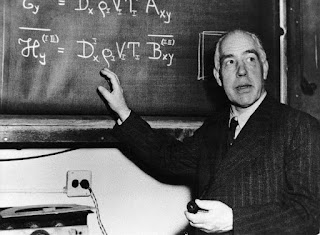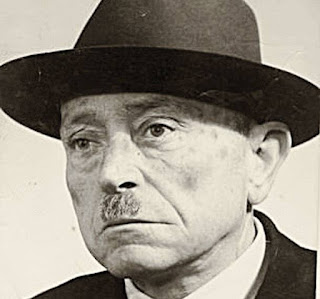Niels Bohr
Niels Henrik David Bohr was born in Copenhagen, Denmark on 7 October 1885. He was a Danish physicist who made foundational contributions to understanding atomic structure and quantum theory, for which he received the Nobel Prize in Physics in 1922. Bohr was also a philosopher and a promoter of scientific research.
Bohr developed the Bohr model of the atom, in which he proposed that energy levels of electrons are discrete and that the electrons revolve in stable orbits around the atomic nucleus but can jump from one energy level (or orbit) to another. Although the Bohr model has been supplanted by other models, its underlying principles remain valid. He conceived the principle of complementarity: that items could be separately analysed in terms of contradictory properties, like behaving as a wave or a stream of particles. The notion of complementarity dominated Bohr's thinking in both science and philosophy.
During the 1930s, Bohr helped refugees from Nazism. After Denmark was occupied by the Germans, he had a famous meeting with Heisenberg, who had become the head of the German nuclear weapon project. In September 1943, word reached Bohr that he was about to be arrested by the Germans, and he fled to Sweden. From there, he was flown to Britain, where he joined the British Tube Alloys nuclear weapons project, and was part of the British mission to the Manhattan Project. After the war, Bohr called for international cooperation on nuclear energy. He was involved with the establishment of CERN and the Research Establishment Risø of the Danish Atomic Energy Commission and became the first chairman of the Nordic Institute for Theoretical Physics in 1957.
Bohr died of heart failure at his home in Carlsberg on 18 November 1962. He was cremated, and his ashes were buried in the family plot in the Assistens Cemetery in the Nørrebro section of Copenhagen, along with those of his parents, his brother Harald, and his son Christian. Years later, his wife's ashes were also interred there. On 7 October 1965, on what would have been his 80th birthday, the Institute for Theoretical Physics at the University of Copenhagen was officially renamed to what it had been called unofficially for many years: the Niels Bohr Institute.
Bohr developed the Bohr model of the atom, in which he proposed that energy levels of electrons are discrete and that the electrons revolve in stable orbits around the atomic nucleus but can jump from one energy level (or orbit) to another. Although the Bohr model has been supplanted by other models, its underlying principles remain valid. He conceived the principle of complementarity: that items could be separately analysed in terms of contradictory properties, like behaving as a wave or a stream of particles. The notion of complementarity dominated Bohr's thinking in both science and philosophy.
During the 1930s, Bohr helped refugees from Nazism. After Denmark was occupied by the Germans, he had a famous meeting with Heisenberg, who had become the head of the German nuclear weapon project. In September 1943, word reached Bohr that he was about to be arrested by the Germans, and he fled to Sweden. From there, he was flown to Britain, where he joined the British Tube Alloys nuclear weapons project, and was part of the British mission to the Manhattan Project. After the war, Bohr called for international cooperation on nuclear energy. He was involved with the establishment of CERN and the Research Establishment Risø of the Danish Atomic Energy Commission and became the first chairman of the Nordic Institute for Theoretical Physics in 1957.
Bohr died of heart failure at his home in Carlsberg on 18 November 1962. He was cremated, and his ashes were buried in the family plot in the Assistens Cemetery in the Nørrebro section of Copenhagen, along with those of his parents, his brother Harald, and his son Christian. Years later, his wife's ashes were also interred there. On 7 October 1965, on what would have been his 80th birthday, the Institute for Theoretical Physics at the University of Copenhagen was officially renamed to what it had been called unofficially for many years: the Niels Bohr Institute.
 |
| Niels Bohr (1885-1962) |


Σχόλια
Δημοσίευση σχολίου